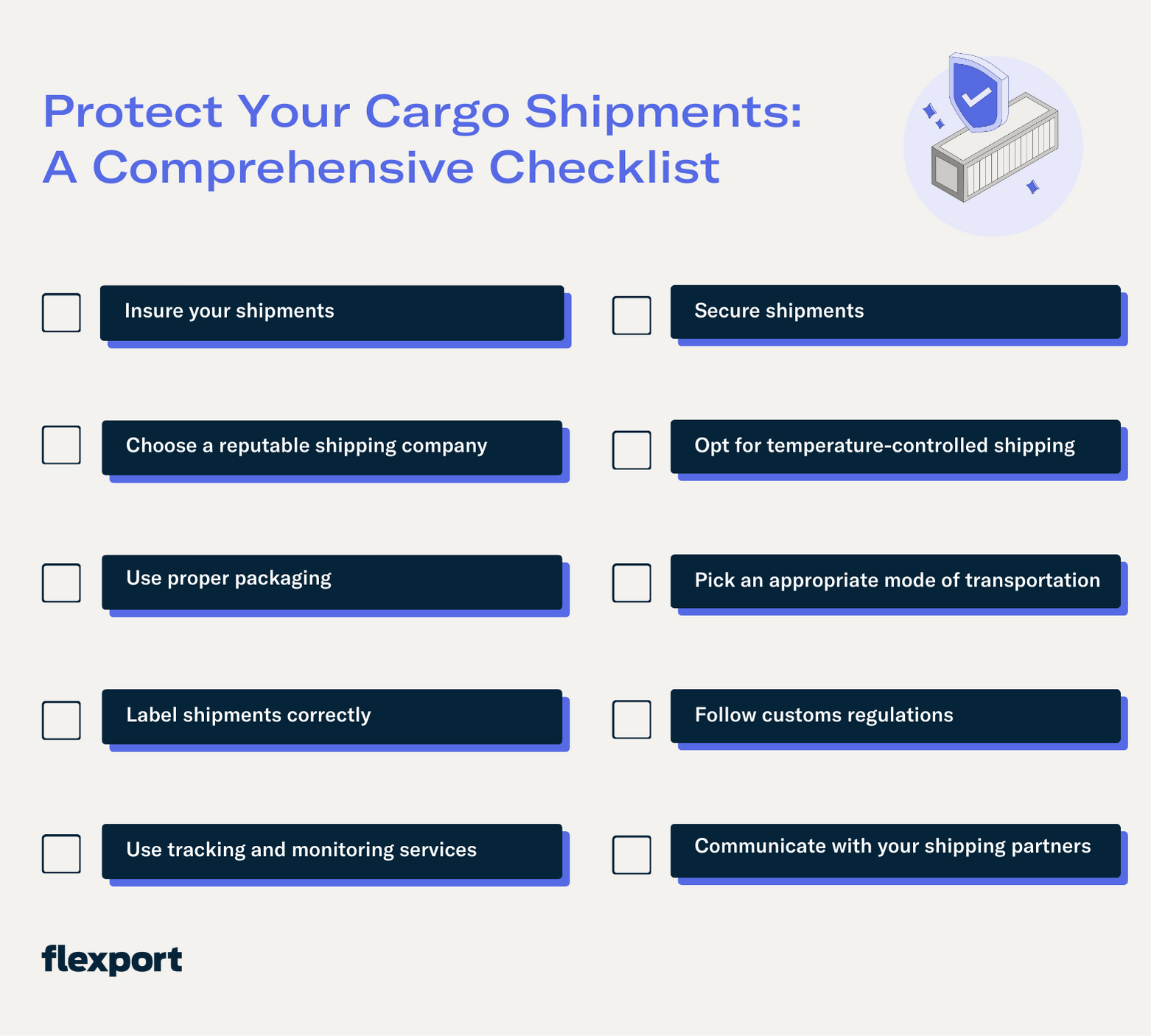
December 19, 2023
10 Strategies That Your Business Can Implement to Protect Your Cargo
10 Strategies That Your Business Can Implement to Protect Your Cargo
Safeguarding your cargo is vital in the dynamic world of shipping. From theft to damaged or missing products to everything in between, it is important for businesses to prepare for the unexpected. To help you lay the groundwork, we’ve compiled ten strategies that your business can implement to protect your cargo investment.

1. Insure Your Shipments
The easiest way to protect your cargo is by obtaining cargo insurance. Cargo insurance can help protect your business from losses due to damage, theft, or other issues that may occur during shipping. Look for insurance policies that offer comprehensive coverage and consider working with a cargo insurance broker like Flexport to find the best policy for your business.
Take Denver Modern, for example: The direct-to-you furniture brand obsessed with durability, design, and comfort wanted a logistics partner that could guarantee protection of their high-end furniture pieces during the shipping process through a cargo insurance policy that was customized to their business needs.
“Flexport is a terrific partner across our global logistics, insurance, and capital needs. The Cargo Insurance team is dedicated to understanding our business, providing a robust and well-priced policy that fits our specific needs—particularly as we have grown.” - Lindsey Price, Co-Founder and CEO of Denver Modern
2. Choose a Reputable Shipping Company
One of the most important things you can do to protect your cargo shipments is to choose a reputable and reliable shipping company. Look for companies that have a history of successfully delivering cargo and review their limits of liability and inquire about their policies, premiums, and claims settlement process.
3. Use Proper Packaging
Proper packaging is essential for protecting cargo during shipping. Use strong, sturdy boxes or containers and cushion the contents with bubble wrap or packing peanuts to prevent damage. Consider using tamper-evident packaging to ensure contents are not tampered with during shipping.
4. Label Shipments Correctly
Clearly label all shipments with the destination address and any special handling instructions, such as "Fragile" or "This Side Up." This will help ensure the cargo is handled properly during shipping and reduce the risk of damage.
5. Use Tracking and Monitoring Services
Many shipping companies offer tracking and monitoring services that allow businesses to follow the progress of their shipments and receive notifications about any issues. This can help your business stay on top of your shipments.
6. Secure Shipments
Take proactive steps to secure your cargo during shipping to prevent theft. This may include using tamper-evident seals on containers, using GPS tracking devices, or hiring security guards to protect shipments during transit.
7. Opt For Temperature-Controlled Shipping
For perishable or temperature-sensitive items, consider using temperature-controlled shipping to ensure that cargo is kept at the proper temperature during transit. This can help prevent spoilage or damage to the contents.
8. Pick an Appropriate Mode of Transportation
Different modes of transportation have different risks and benefits. For example, air cargo is generally faster; however, it may carry the risk of damage due to handling procedures and turbulence. Ocean shipping, on the other hand, may expose cargo to the threat of moisture. rucking is more flexible but may be more vulnerable to theft. Choose the mode of transportation that best meets the needs of your business and the risk-level you can afford to take.
9. Follow Customs Regulations
When shipping internationally, it's important to follow all customs regulations and to work with a reputable customs broker to limit the risk of delays or cargo seizure.
10. Communicate With Your Shipping Partners
Good communication with your shipping partners, including the shipping company, carriers, and receivers, can help ensure that your cargo is handled properly and delivered safely. Keep your partners informed of any changes or issues that may affect the shipment, and work with them to resolve any problems that may arise.
As you embrace these ten cargo protection strategies, you are not only safeguarding your cargo shipments, but also fortifying the backbone of your business. To find out more about cargo insurance available through Flexport Insurance Solutions, LLC, please reach out to our team of licensed experts today.
Insurance is offered through Flexport Insurance Solutions, LLC ("FIS"), a licensed insurance producer (Illinois License No. 3001047128, California License No. 6001029). Insurance is not available in all countries. Check with a licensed FIS representative for availability.
For term coverage, FIS acts as an insurance broker and seeks quotes from multiple insurance carriers with A.M. Best ratings of “A” or higher who actually underwrite and issue coverage. Per shipment coverage is underwritten and issued by Navigators Insurance Company.
The contents of this blog are made available for informational purposes only and should not be relied upon for any legal, business, or financial decisions. We do not guarantee, represent, or warrant the accuracy or reliability of any of the contents of this blog because they are based on Flexport’s current beliefs, expectations, and assumptions, about which there can be no assurance due to various anticipated and unanticipated events that may occur. This blog has been prepared to the best of Flexport’s knowledge and research; however, the information presented in this blog herein may not reflect the most current regulatory or industry developments. Neither Flexport nor its advisors or affiliates shall be liable for any losses that arise in any way due to the reliance on the contents contained in this blog.






